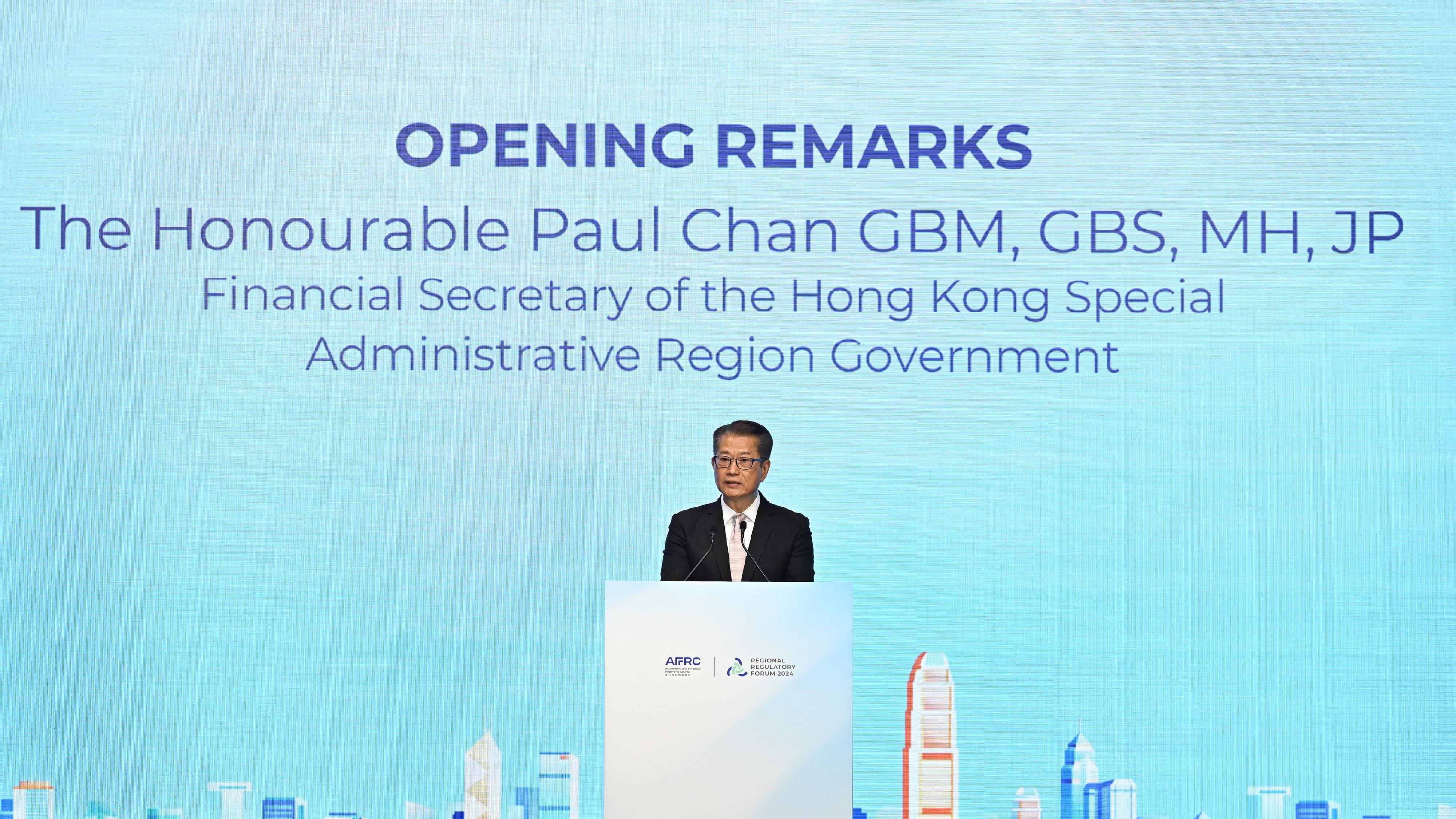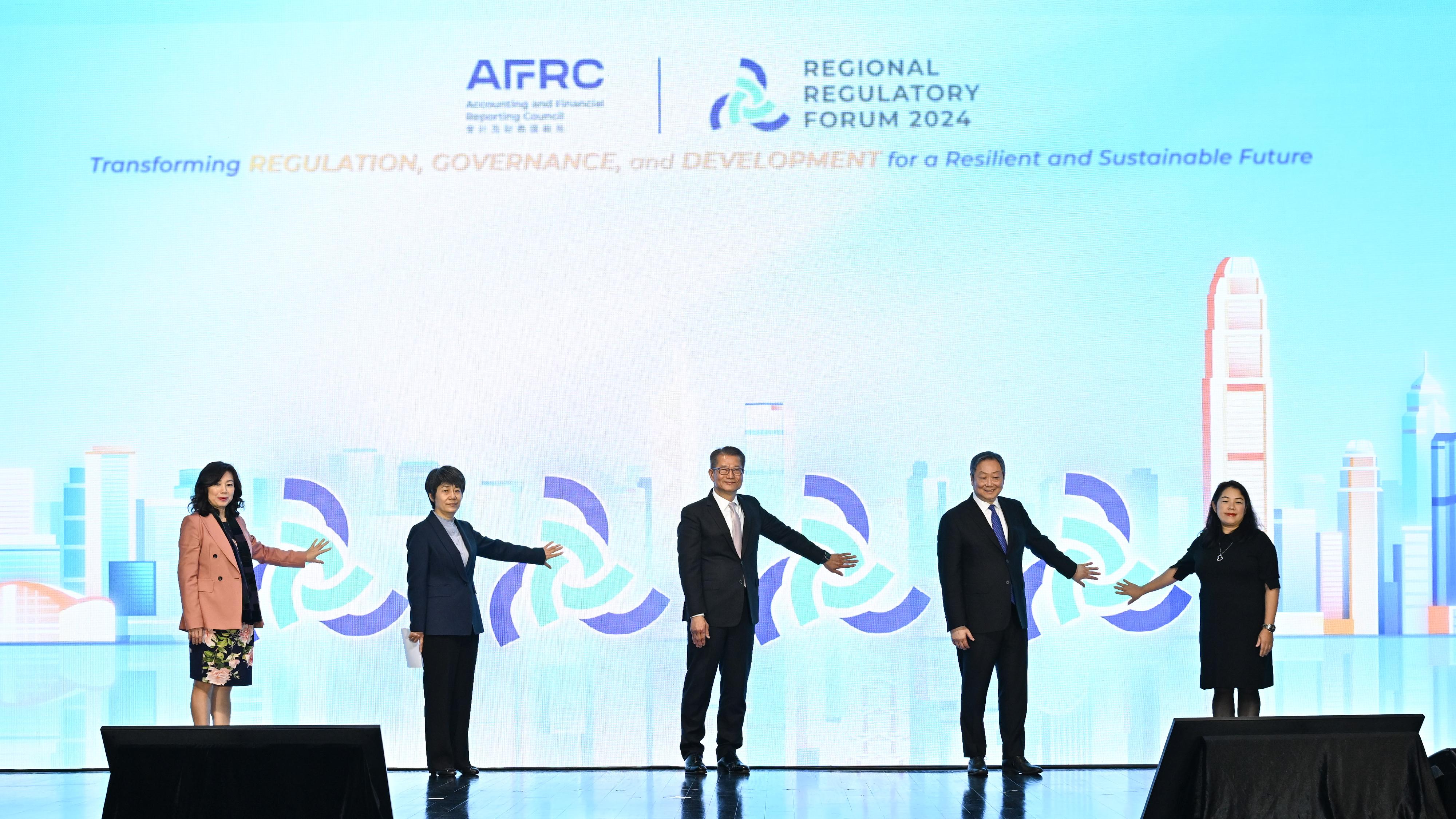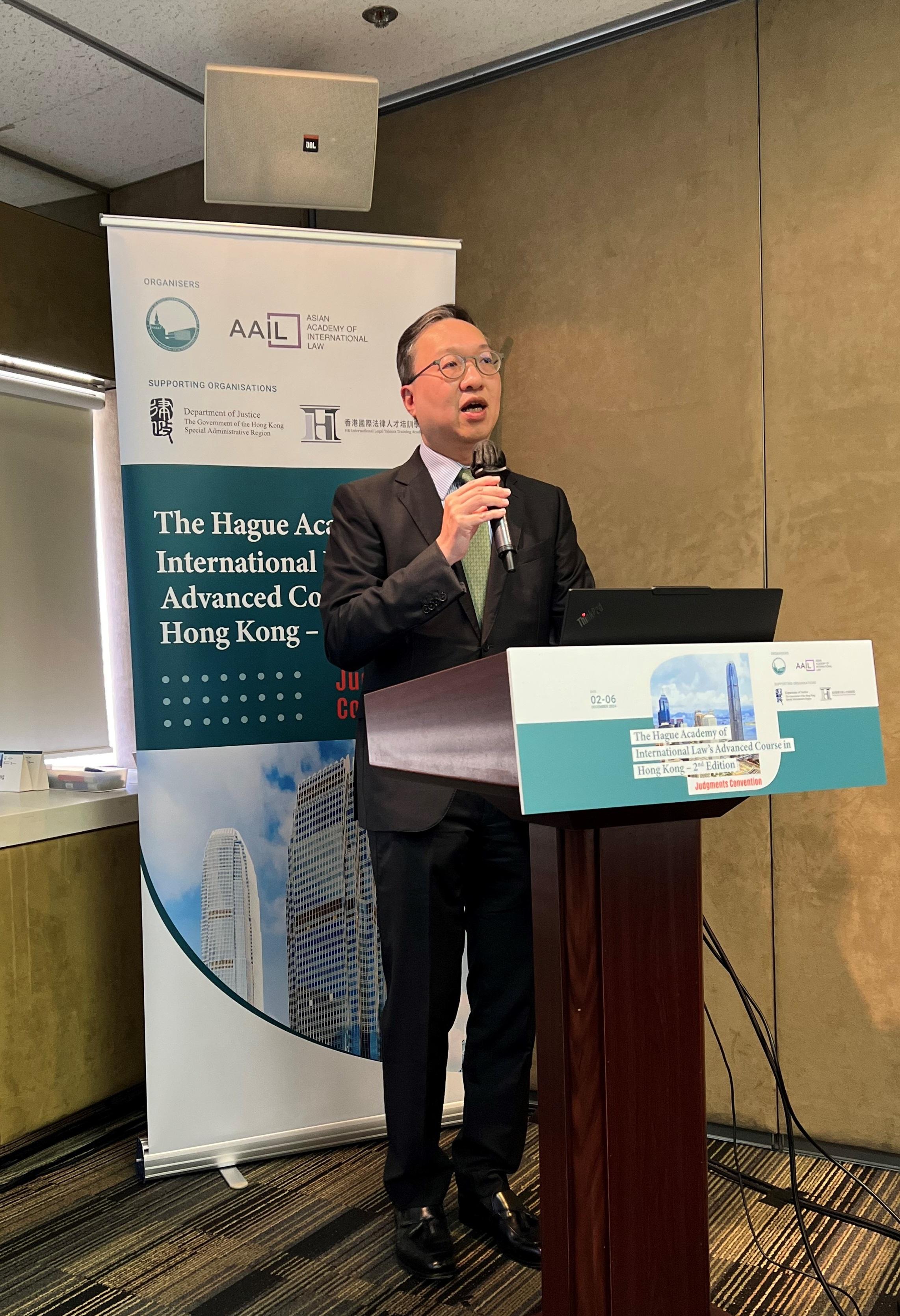Speech by FS at Accounting and Financial Reporting Council Regional Regulatory Forum 2024 (English only) (with photos)
Following is the speech by the Financial Secretary, Mr Paul Chan, at the Accounting and Financial Reporting Council Regional Regulatory Forum 2024 today (December 2):
Vice Minister Guo Tingting (Vice Minister of the Ministry of Finance), Kelvin (Chairman of the Accounting and Financial Reporting Council, Dr Kelvin Wong), Sir David (Special Advisor of the International Valuation Standards Council and first Chairman of the International Accounting Standards Board, Sir David Tweedie), distinguished guests, ladies and gentlemen.
Good morning. Im delighted to be here, among friends and colleagues, for the opening of the Regional Regulatory Forum of the Accounting and Financial Reporting Council, the AFRC – the first regional event it has hosted since it became an independent regulatory body of the accounting profession.
I’d also love to extend a warm welcome to many of you from abroad for this inaugural gathering of accountants, regulators, business and industry leaders, investors, academics and other stakeholders.
The theme of today’s forum, “Transforming Regulation, Governance and Development for a Resilient and Sustainable Future”, smartly distils the Hong Kong SAR (Special Administrative Region) Government’s proposition for the regulation and development of our financial markets in general and the accounting profession in particular.
Hong Kong’s approach to financial regulation
As a small, open and externally oriented economy, Hong Kong is a “super connector” and “super value-adder”, bridging China and the rest of the world.
This role is delicate, given the volatility of today’s global financial markets amid the rising economic and geopolitical challenges.
But as an international financial centre that has weathered trials and tribulations, Hong Kong is well equipped to fulfil this role.
We have unique advantages. The first, of course, is the institutional strengths under the “one country, two systems” principle. On the one hand, we enjoy convenient, and at times priority, access to the Mainland market. On the other, we maintain the character that defines us as an international city. That includes the common law system, respect for the rule of law, and a judiciary that exercises powers independently; the free flow of capital, goods, information and talent; a simple and low tax regime; business and professional standards aligning with the best international standards; and extensive international connections. The list goes on.
The “one country, two systems” arrangement is not for expediency. It is designed to advance the interests of Hong Kong and our country in the long term. It is here to stay. President Xi Jinping has reiterated this on multiple occasions.
These institutional strengths underpin our second advantage: connectivity. Hong Kong is the prime springboard for businesses and capital from around the world seeking convenient access to the thriving opportunities in China, the world’s second-largest economy. The Connect Schemes are doing just that. It provides international investors with access, via Hong Kong, to the capital markets of the Mainland, across areas from stocks, bonds, to ETFs (exchange-traded funds) and REITS (real estate investment trusts) and derivatives, and vice versa for Mainland investors.
Our ability to connect is supported by our people, too. We have top-notch financial and other professionals that possess expertise, experience and global networks.
Above all, Hong Kong has become what it is because international investors and businesses have confidence in us. Despite what many may have read or heard about Hong Kong every now and then, facts and figures show that Hong Kong continues to shine.
Recently, we reclaimed the third position in the global financial centres ranking. We rank fifth in global competitiveness according to the IMD of Switzerland. Local bank deposits have grown by more than 11 per cent, or about US$220 billion, from the beginning of 2023 to September this year. The number of foreign companies in Hong Kong is also rising.
This confidence is vested in the stability and integrity of our financial system. This leads to our third advantage: our commitment to robust, balanced financial regulation.
Our philosophy is this: regulation and development complement each another. Regulation is not an end in itself, but the means to promote sustainable development and create long-term benefits for all. This philosophy is at the core of our regulatory regimes across different areas of our financial services sector, from banking to securities, and of course, the accounting sector as well.
Accounting regulation and development in Hong Kong
The global regulatory landscape for the accounting and audit profession has been evolving. Many jurisdictions have established independent oversight systems for their accounting sectors, and are continually reviewing and enhancing their regimes. While the progress of reform may vary, a common trend is to move away from self-regulation towards one by independent regulatory bodies.
Hong Kong is of no exception. In October 2022, we took a major step by re-organising the Financial Reporting Council to become the AFRC, to rationalise our accounting sector’s regulation and development.
Like many of our financial regulators, the AFRC has a dual mandate: ensuring high-quality financial reporting, while facilitating and supporting the development of the accounting sector.
Over the past two years, the Government, the AFRC and the sector’s statutory professional body, the Hong Kong Institute of Certified Public Accountants, HKICPA, have been working together to do just that, through standards setting, proper inspections, investigation and disciplinary actions, among other initiatives.
Cross-border collaboration is essential to this process, particularly given the strong presence of Mainland and international companies in Hong Kong.
Thanks to the unwavering support of the Ministry of Finance of our country, the AFRC is able to access and inspect audit working papers in both Hong Kong and the Mainland. The Council continues to participate in joint inspections with the Central Authorities and the PCAOB (Public Company Accounting Oversight Board) of the United States with regard to entities listed on the US Stock Exchanges.
Separately, the AFRC is also dedicated to nurturing talent and providing professional development support. I’m pleased to note that last year, over 11 000 professionals and stakeholders were engaged in the AFRC’s policy research and other engagements.
Hong Kong embraces talent with open arms through various talent admission schemes, accountants included, of course.
And last year, the HKICPA renewed its membership recognition arrangements with five chartered accountancy bodies of the Global Accounting Alliance, making it easier for overseas professionals to build their careers in Hong Kong.
Looking ahead
Ladies and gentlemen, looking ahead, two major global trends are reshaping the accounting profession.
First, climate change and sustainability. As the world pursues carbon neutrality and net-zero transition in combating climate change, expectations are growing for companies worldwide to report such information by adhering to a set of internationally recognised sustainability reporting standards. That naturally also demands a robust sustainability assurance process that can verify the accuracy and integrity of reported information. In other words, the role of auditors is evolving to cover not just traditional financial metrics but also ESG (environmental, social and government) elements, which are crucial for informed investment decisions.
In this regard, Hong Kong is on track to be among the first jurisdictions globally to align our local sustainability disclosure requirements with international standards set by the International Sustainability Standards Board.
For instance, new climate-related disclosure requirements, based on international standards, have been integrated into the Listing Rules of the Hong Kong Stock Exchange. They will take effect beginning in 2025 in a phased manner. Separately, the HKICPA in October completed a consultation on the financial reporting standards on sustainability disclosures.
Hong Kong will develop a pragmatic regulatory framework on sustainability assurance, taking into account the latest international developments.
Second, technological change. Artificial intelligence, for instance, impacts everything, including skilled jobs like those in accounting. While automation may save costs and raise efficiency and reliability, it also raises issues such as cybersecurity, data privacy, and skill gaps among accounting professionals. These challenges call for attention to whether our regulatory framework can keep pace with technological advancement, and whether we can provide accounting professionals with adequate training and support so that they can continue to fulfil their duties competently.
There is much work ahead, requiring collaboration both locally and globally. This makes today’s Forum all the more meaningful. It is a valuable opportunity to learn and share insight and wisdom on the future of the accounting profession and its regulation.
For that, my thanks to the AFRC, and to each and every one of you here. I wish you all a rewarding Forum and the best of business, and health, in the coming years. And please make time to discover Hong Kong, Asia’s world city. Thank you very much.













